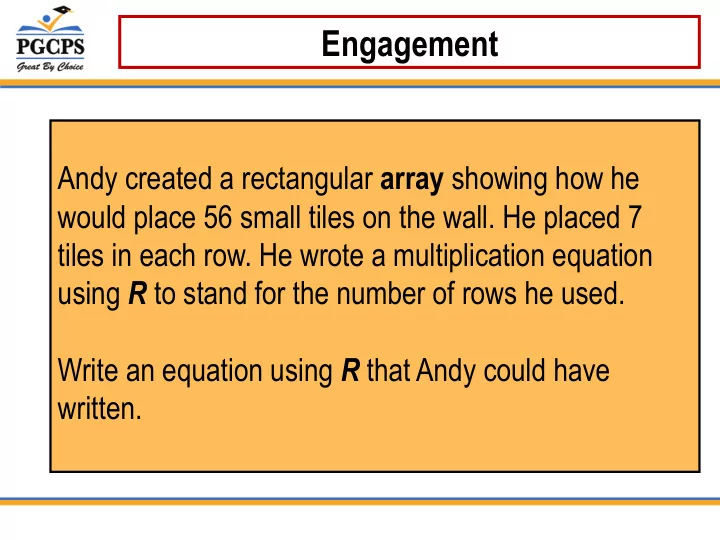

Engagement Andy created a rectangular array showing how he would place 56 small tiles on the wall. He placed 7 tiles in each row. He wrote a multiplication equation using R to stand for the number of rows he used. Write an equation using R that Andy could have written.
Outcomes Participants will: } Gain knowledge of Common Core State Standards for Mathematics. } Receive strategies and resources to support their child at home based on the Common Core State Standards for Mathematics. } Engage in mathematical tasks to better understand the expectations of Common Core State Standards for Mathematics.
The Common State Standards Core(CCSS) (Maryland College and Career Readiness Standards) } Provide a consistent and clear understanding of what students are expected to learn. } Designed to be robust and relevant to the real world . } Reflect the knowledge and skills young people need for success in colleges and careers . The Maryland College and Career Ready Standards for Mathematics can be found on the following link: http://mdk12.msde.maryland.gov/ instruction/curriculum/mathematics/index.html
Common Core State Standards (CCSS) (Maryland College and Career Readiness Standards) Standards for Mathematical Practice Content Standards How students are learning. What the students are learning. Counting and Cardinality 1. Make sense of problems and persevere in solving them Operations & Algebraic Thinking 2. Reason abstractly and quantitatively Number & Operations in Base Ten 3. Construct viable arguments and critique the understanding of others Number & Operations –Fractions 4. Model with mathematics 5. Use appropriate tools strategically Measurement & Data 6. Attend to precision Geometry 7. Look for and make use of structure 8. Look for and express regularity in repeated reasoning Ratios & Proportional Relationships, The Number System, Expressions & Equations, Statistics & Probability
CCSS Math Instructional Shifts 1. Focus : Delving deeper into fewer topics per grade level. 2. Coherence : Linking topics and thinking across grades 3. Rigor : Pursue conceptual understanding, procedural skills and fluency, and application with equal intensity
Required Fluency Expectations Grade Required Fluency K Add & Subtract within 5 1 Add & Subtract within 10 2 Add & Subtract within 100 3 Multiply/divide within 100 & Add/Subtract within 1000 4 Add & Subtract within 1,000,000 5 Multi-Digit Multiplication 6 Multi-Digit Division & Multi-Decimal Operations
Choose a strategy to solve 57 + 43. ¡ Work with a partner to solve 3 different ways. ¡ Use pictures ¡ Symbols or ¡ Objects
Let’s model using bundles of 10 +
Model to solve 57 + 43. ¡ Use bundles and sticks
100
Using symbols ¡ 57 + 43 50 + 7 + 40 + 3 50 + 40 + 7 + 3 (50+40) + (7+3) 90 + 10 100
What is PARCC?- How will students be assessed? The Partnership for the Assessment of Readiness for College and Careers (PARCC)—has been awarded federal funding to develop an assessment system aligned with the CCSS.
1000-(72 +48) = 880 8 more than Ted- Ella took 80 pictures Ella took 80-48 more than Mary. Ella took 32 more than Mary
The model shows that 4/12 = 1/3. When you compare fractions with the same denominator, you can compare the numerators since all pieces are the same size and 4 < 6..
Supporting Your Child at Home
Supporting Your Child at Home
Resources to Support Student Learning Grades 2-4 301-772-0080
Elementary Mathematics Department Contact Information ¡ Judith Russ-jruss@pgcps.org Ø Elementary Mathematics Supervisor ¡ Patricia Morrison-patric.morrison@pgcps.org Ø Elementary Mathematics Specialist ¡ Lisa Green- lisa.green@pgcps.org Ø Elementary Mathematics Specialist/Special Education ¡ Myrtle Davis-myrtled@pgcps.org Ø Elementary Mathematics Resource Teacher ¡ Marcia Sun-marcia.frank@pgcps.org Ø Elementary Mathematics Resource Teacher ¡ Thierno Johnson-thierno.johnson@pgcps.org Ø Elementary Mathematics Resource Teacher Office Phone (301) 749-5610
Recommend
More recommend